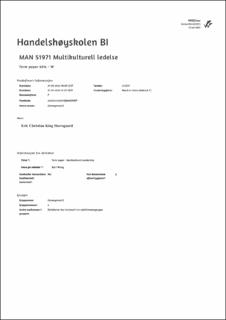| dc.description.abstract | Mini Case – Differences at Work
Based on Agerström et al. (2009) article, how would you apply to this case to classify the prejudice and hostile remark during the conversation – explicit or implicit prejudice?
The Agerström et al. (2009) article describes the implicit and explicit prejudice within the Swedish workplace, especially in regards to Arab-Muslims vs. Swedes. Through IAT tests it uncovers a large deviation between the explicit biases the participants admitted to, and their implicit biases, showing that we are not aware of how our own implicit bias can impact our actions and decisions. Sameer, an Indian-Muslim, was well within his right to react when a coworker made a horrible remark, expressing they wished an earthquake would strike the Gaza strip, after the news reported on a Hamas attack and an earthquake in some other part of the world. Implicit prejudice refers to the attitudes and stereotypes that affect our actions, decisions, and understanding in an unconscious manner. This means that people may not be aware that they hold certain biases and prejudices towards a particular individual or group. These attitudes and stereotypes are often formed through cultural and societal norms and are deeply ingrained in people's subconscious. Implicit prejudice can manifest in various ways, including microaggressions, negative attitudes, and discrimination. Explicit prejudice refers to conscious and intentional negative beliefs and behaviors towards an individual or group. It is characterized by the open expression of biased opinions and discriminatory actions. Explicit prejudice is often based on preconceived notions and stereotypes about certain individuals or groups, and can lead to acts of discrimination and harassment. (Nelson, 2009)
In my opinion this remark would be explicit prejudice, as it is so blatant and overt, and based on what I would assume is a conscious contempt of Palestinians, and/or Arab-Muslims.
For example, some coworkers may have found the joke unfunny but chose to conform to group thinking and mimic others' reactions. Additionally, because the email came from a company leader, the coworkers may have felt pressure to conform to the company culture. The fact that coworkers and leaders feel comfortable communicating offensive remarks and jokes suggests that they assume Sameer is "one of them" and not sensitive to religious and cultural attacks. They may assume that Sameer's loyalty to the group is higher than his loyalty to his own identity. | en_US |
